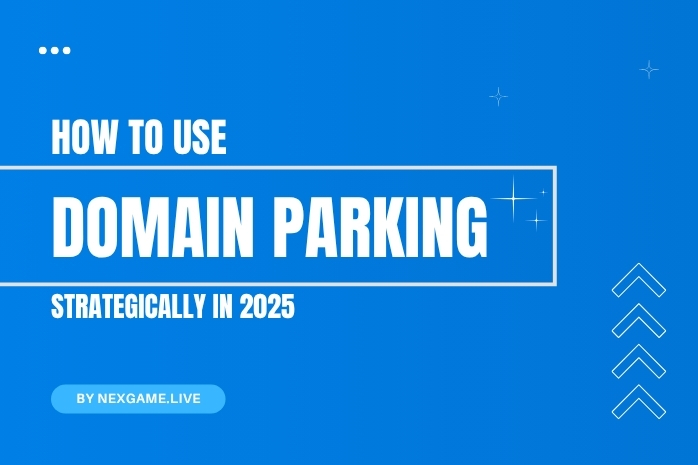How to Use Domain Parking Strategically in 2025 Published: 16 Jun, 2025

In 2025, domain parking has evolved from a passive placeholder to a strategic asset. Whether you're securing a domain for future development, protecting your brand, or monetizing unused names, parking can play a vital role in your digital strategy—when used properly.
Yet, many domain owners either misuse it or ignore its potential. This guide will help you understand what domain parking is, when to use it, and how to benefit from it without harming your domain’s reputation or SEO.
What Is Domain Parking?
Domain parking is the practice of registering a domain name without pointing it to a fully functioning website. Instead, it may display a basic landing page, an "under construction" notice, ads, or nothing at all.
Domain registrars and marketplaces often offer parking services, displaying ad pages while allowing you to keep the domain in your name. Some setups even generate passive income through ad clicks.
There are generally two types of domain parking:
-
Monetized parking: Shows ads related to the domain’s keywords. Revenue is earned from user clicks.
-
Non-monetized parking: Displays a placeholder, brand message, or "coming soon" note without ads.
Why Would You Park a Domain in 2025?
Here are the most common strategic reasons for parking:
1. Domain investment
If you're a domain investor, you may own multiple domains waiting to be sold. Parking helps hold them in your name and sometimes earn income while they're listed for sale.
2. Brand protection
You might buy similar spellings, misspellings, or variations of your main domain to prevent competitors or scammers from acquiring them. Parking them avoids confusion and strengthens your brand perimeter.
3. Pre-launch preparation
Before launching a new site or project, parking the domain with a message like “Coming Soon” helps lock in your branding while giving you time to build.
4. Monetization of unused assets
If you have unused domains, you might as well earn a little from them with relevant ad-based parking—especially if they attract type-in traffic.
How to Park a Domain Safely and Effectively
While parking seems simple, it can lead to problems if not done thoughtfully. Here's how to do it the right way in 2025:
Avoid low-quality or spammy parking pages
Many monetized parking services fill the page with irrelevant, outdated, or suspicious-looking ads. These can damage the domain’s reputation and even affect resale value. Use trusted providers only.
Use parking pages that allow customization
Being able to add your logo, a short message, or a lead capture form can turn a parked domain into a branding opportunity instead of a dead-end.
Enable domain redirects if appropriate
Sometimes, instead of a parked page, it’s better to redirect the domain to your main site or a relevant landing page. This is especially useful for misspellings or brand variants.
Monitor DNS health and reputation
Even parked domains can be attacked or misused. Always secure your parked domains with registrar locks, auto-renewals, and regular DNS checks.
Be cautious with SEO
Parking multiple domains on identical or thin ad pages can trigger SEO issues or even be seen as spammy behavior by search engines. If SEO matters, consider redirecting rather than parking.
Domain Parking vs. Domain Forwarding
These two terms are often confused. Domain forwarding actively redirects visitors to another site, while domain parking displays a static placeholder. Each has different use cases.
For example:
-
Park domains you want to sell or keep idle.
-
Forward domains you want users to reach your main brand or product.
In 2025, many domain owners mix both strategies as part of their broader domain management approach.
When Not to Park a Domain
While parking is useful, avoid doing it in these situations:
-
For important active projects – A real website is better than a placeholder.
-
With low-quality parking services – They can expose your domain to malware, spam, or blacklist risks.
-
If you want search engine visibility – Parked pages rarely rank and might confuse crawlers.
If your goal is branding, SEO, or lead generation, consider building a basic but functional landing page instead.
Final Thoughts
Domain parking, when done right, is far from outdated—it’s a tactical move in your digital playbook. Whether you're holding names for resale, preventing cybersquatting, or prepping a future project, parking gives you flexibility.
Just remember that in 2025, online reputation and domain security matter more than ever. Park your domains wisely, monitor them actively, and you’ll stay ahead of the game while your digital assets work quietly in the background.
FAQs
1. Can parking a domain generate real income in 2025?
Yes, but only if the domain gets type-in traffic or ranks for valuable keywords. Most earnings are modest unless you own high-value names.
2. Will parking a domain affect its SEO?
Parked domains usually don’t rank well. If you want search visibility, use redirects or a simple landing page instead.
3. How do I know if my parked domain is safe?
Check it regularly for spammy ads, enable domain lock, and monitor DNS settings to prevent misuse.
4. Is domain parking allowed with all registrars?
Most registrars offer it by default, but terms vary. Always check their parking and monetization policies.
5. Should I park domains I’m not using yet?
Yes. It helps secure your name, prevent misuse, and gives you time to plan your next steps.